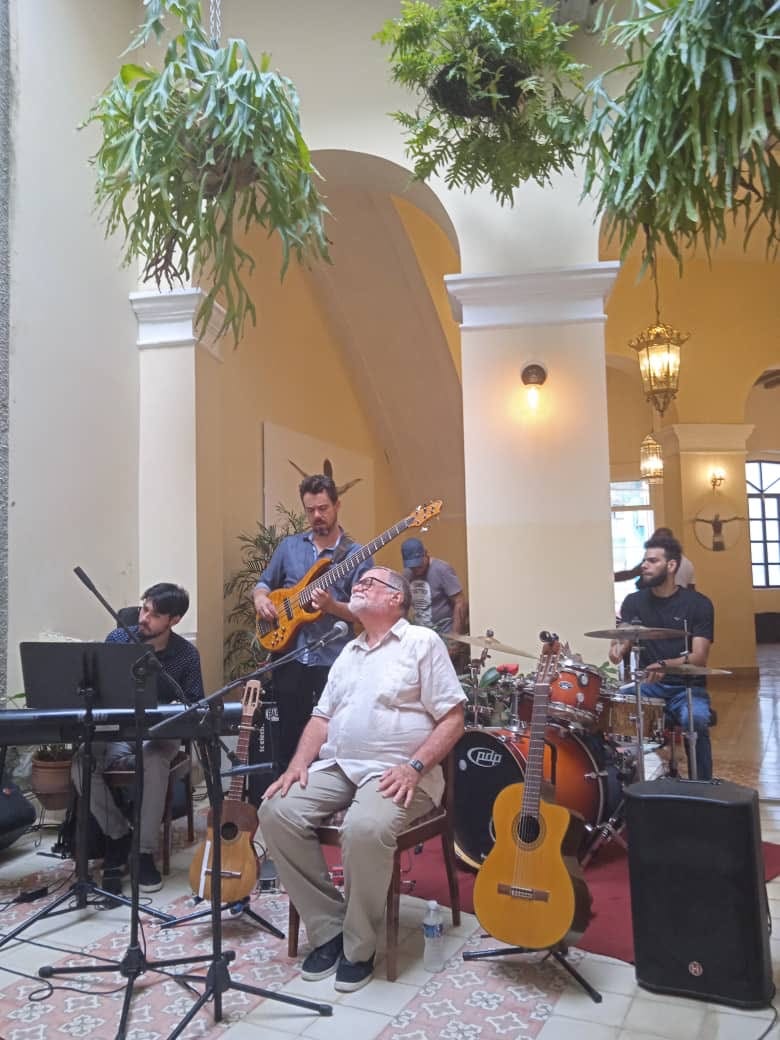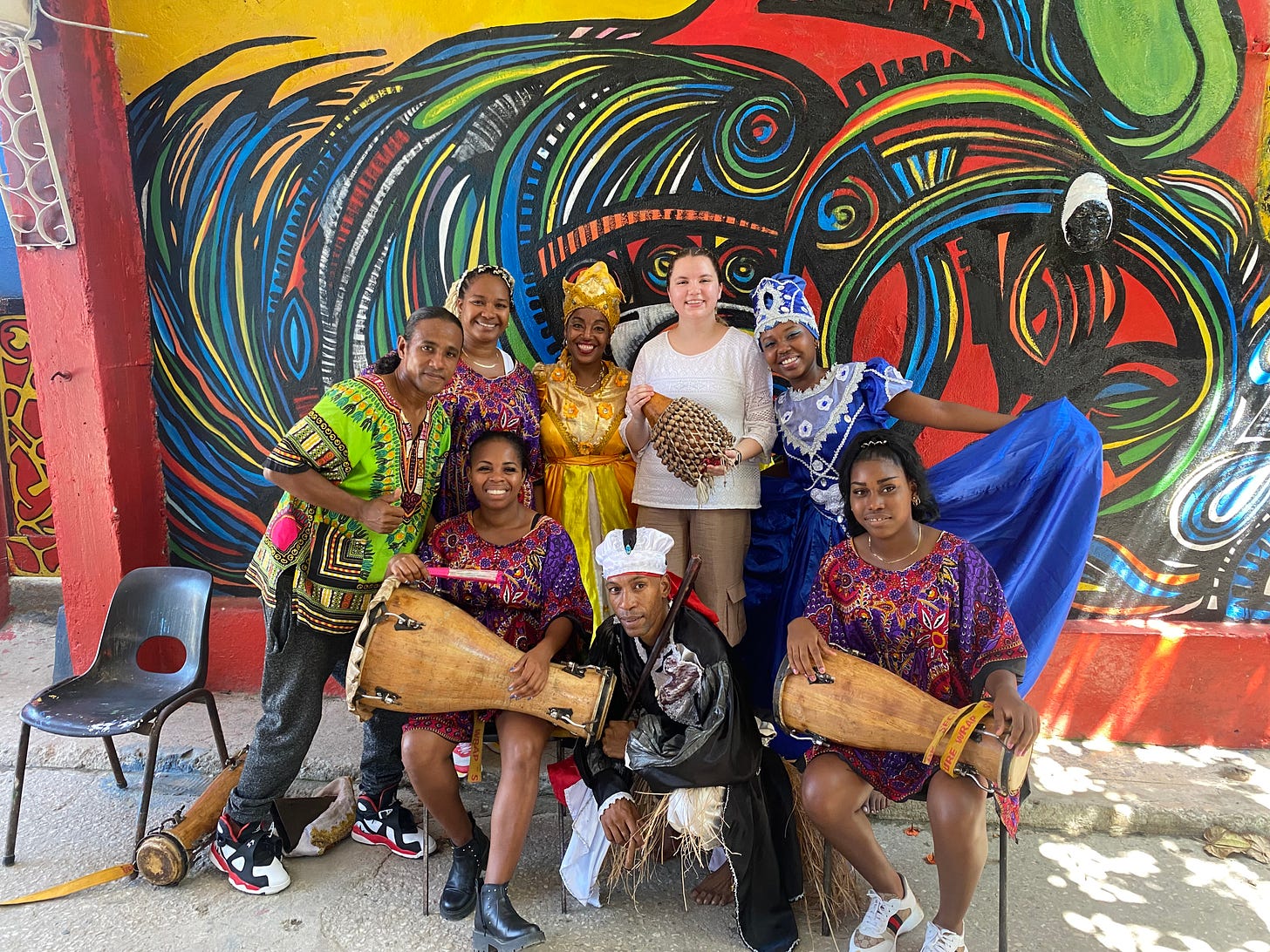Imagine arriving in a place without understanding what is being said. Words flowing around you, too fast for you to comprehend. You have no experience with the language, besides being able to say hello. You feel lost and alone, even though you are surrounded by people. That's exactly how I felt when I arrived at the airport in Havana, Cuba.
I immediately gravitated towards the few Spanish speakers in our group, eager to learn as many words as possible to better connect with the local population. However, my limited use of 'por favor' and 'gracias' didn't magically make me a fluent Spanish speaker, so I had to rely on others to help me understand. I felt completely clueless and desperately wanted a way to connect with all the locals we were meeting. Without Spanish, how would I accomplish that? That's when I heard the first conga beat.
I felt the rhythms throughout my entire body, the music spreading, practically making me dance right there in the middle of the crowded street. The musicians were singing in Spanish, and somehow, I understood them. How, you ask? Through the power of music. I didn't know what they were saying, I couldn't even pick out a single word. But their music moved me and made me feel in a way that I could understand the message they were creating through their chords. Right then and there, I thought to myself, "Who needs to know Spanish when you can listen to music!" That is why I believe music is the universal language.
Delving deeper into this subject, eager to learn more about how music can be understood by different cultures and countries, I came across an article by Jed Gottlieb, a Harvard correspondent, who reported on how music is universal. Accotding to the article, they have discovered that “across societies, music is associated with behaviors such as infant care, healing, dance, and love…..songs that share behavioral functions tend to have similar musical features.”[i] This means that in any culture, different types of music are well understood by all, even if language is a barrier that usually interferes with comprehension. Music is easy to understand because, universally, people experience the same emotions, and write music that expresses those emotions. Listening to the music in Cuba, I felt immense joy, and the music made me want to dance. Due to this, I knew that the musicians were expressing the same emotion.
Alberto Faya singing traditional Cuban music - Photo by Author
While in Havana, we learned about the origins of Cuban music from professional musician Alberto Faya. He explained that much of what the world recognizes as Latin or Cuban music has its roots in Africa. In the early 16th century, Cuba began receiving African slaves to work on sugar plantations and search for gold on the island. These Africans formed Cabildos, groups that worked to preserve their African heritage.[ii] This preservation included playing African drums and singing songs that held spiritual significance in their culture and religion. He even demonstrated this by singing a traditional African song for us![iii] These efforts not only shaped Cuban music into what it is today but also influenced Western music, particularly in the United States. Due to the African slave trade, sugar trade, and numerous wars, Cubans and Americans interacted extensively in the centuries following Cuban settlement.[iv] During this period, music was shared, adapted, and transformed into what we now know as "American Music.” Cubans cherish music because it is a link to their heritage, and it helps them feel connected with each other and their ancestors.
Not only do cross-cultural emotions help us understand music in any location, but the connected roots from which music was born give us a shared heritage that encourages cultural camaraderie throughout the world. It is definitely an eye-opening experience to feel the same way about music in your hometown and halfway across the world. Music makes us feel in a way that nothing else can and provides an outlet to express any emotion imaginable. Music can be created by the rustling of leaves, the sounds of heavy traffic, a dripping faucet, and so many more everyday experiences. This makes music one of the few things that are universally experienced.
Members of the Santeria Religion after a demonstration of their music - Photo by Author
Music also allows people to express devotion to something. During the trip, we learned about a Cuban religion with African origins called Santeria. In this religion, music is used to create visions, magic, or spiritual experiences. Though I didn’t understand their religion through vocal explanation, the demonstration of music and dance gave me insight into their passion and commitment to their gods and religious practices. In many religions, music is used to invite feelings of contemplation and spirituality, but this is mainly done through melodies and light percussion. The loud, rhythmic drums, Shekeres (a shaker carved out of a gourd), and chanting were a very different, but not unwelcome form of religious music that I had never previously experienced. This exposure helped me realize that music doesn’t have to be melodic or light to help you feel something and that anyone can create a genre that speaks to people.
Looking back on this experience, I am immensely grateful to have traveled to a place where music is so important. It helped me feel more comfortable with my new surroundings, and embrace a culture that I genuinely didn’t know anything about. I learned a lot about the people of this struggling island through their love of song and dance, and couldn’t help feeling a little bit sad when I heard a pop song on the radio back in Miami. Music is one of the most important things in any culture and many religions, and it has been passed down through countless generations, morphing into what we hear today. I believe the preservation of this beautiful art form will be essential to understanding people — where they come from, what they believe, and how they feel. It can also help bridge the gap between social and political boundaries, binding us together through our differences, creating a medium for peace to be felt by even the most different of nations. How cool is that!
[i] Gottlieb, J. (2023, November 9). Music everywhere. Harvard Gazette. https://news.harvard.edu/gazette/story/2019/11/new-harvard-study-establishes-music-is-universal/
[ii] Boogalu. (n.d.). Cuban Music History. https://www.hostedhavana.com/resources/cuban-music-history
[iii] New York Jazz Academy. (2015, December 11). NYJA Cuba 2014: Alberto Faya Sings [Video]. YouTube.
[iv] Brenner, P. (2022). Ada Ferrer. Cuba: An American History. ˜the œAmerican Historical Review, 127(3), 1502–1503. https://doi.org/10.1093/ahr/rhac292





